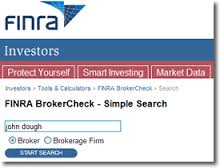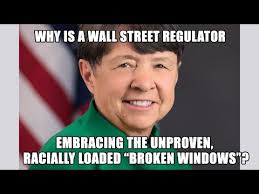
(National Law Review)-FINRA and MSRB Propose New Pay-to-Play Restrictions on Broker-Dealer Solicitors and Municipal Advisors; Rules Will Trigger SEC Investment Advisor Third-Party Solicitation Ban
The following brokerdealer.com update is courtesy of submission to National Law Review by Greenberg Traurig, LLP
On Dec. 16, 2015, the Financial Industry Regulatory Authority (FINRA) and Municipal Securities Rulemaking Board (MSRB) simultaneously filed with the Securities and Exchange Commission (SEC) rule proposals that will have broad and substantial impacts on the political giving of broker-dealers, investment advisers and municipal advisors and their ability to engage in business with governmental entities under SEC, FINRA and MSRB rules.
The FINRA proposal seeks to establish so-called pay-to-play restrictions on broker-dealers that engage in certain distribution and solicitation activities on behalf of investment advisers (third-party solicitors) under new FINRA Rule 2030, on Engaging in Distribution and Solicitation Activities with Government Entities, and associated FINRA Rule 4580, on Books and Records Requirements for Government Distribution and Solicitation Activities. The MSRB proposal would extend to municipal advisors (including certain third-party solicitors) its existing pay-to-play rule applicable to municipal securities broker-dealers, MSRB Rule G-37, Political Contributions and Prohibitions on Municipal Securities Business and Municipal Advisory Business.
The FINRA rules, and in part the MSRB rule amendment, are designed to complement the SEC’s existing pay-to-play rule for investment advisers, Rule 206(4)-5 under the Investment Advisers Act of 1940. When effective, the FINRA and MSRB rules would trigger compliance requirements under the SEC’s ban on third party solicitations on behalf of investment advisers under SEC Rule 206(4)-5, as provided for under SEC staff’s current no-action posture which has put this provision of the SEC pay-to-play rule in abeyance subject to completion of FINRA and MSRB rulemaking.
While each rule has its own unique provisions, the SEC, FINRA and MSRB pay-to-play rules generally create two-year bans, or “time-outs,” from engaging in investment advisory, underwriting/distribution or municipal advisory activities with state or local governmental entities if the investment adviser, broker-dealer or municipal advisor firm or specific professionals within the firm have made political contributions to elected officials of such governmental entities, subject to permitted de minimis contributions. The rules also prohibit such firms and professionals from soliciting or coordinating political contributions by others to elected officials of governmental entities with which they are undertaking or seeking business, or to state or local political parties within any jurisdiction where such business is being undertaken or sought.
In addition, the SEC rule prohibits investment advisers from paying a third-party to solicit on their behalf a governmental entity for investment advisory business unless such third-party is subject to the SEC, FINRA or MSRB pay-to-play rule. The MSRB rule also includes a public disclosure regime that requires quarterly information filings with the MSRB that are made public on the MSRB’s Electronic Municipal Market Access (EMMA) website. Finally, the Commodity Futures Trading Commission (CFTC) also has adopted its own pay-to-play rule for swap dealers entering into swap transactions with governmental special entities, Rule 23.451 on Political Contributions By Certain Swap Dealers. Firms covered by one or more of these pay-to-play rules will need to engage in extensive compliance and recordkeeping activities that take into account the range of activities they undertake and the varying requirements of the applicable SEC, CFTC, FINRA and/or MSRB rules.
The FINRA and MSRB proposals are subject to the SEC’s public comment and approval process, and the restrictions and related requirements would apply only for contributions made after the effective date, which would be a date to be announced no sooner than 6 months after SEC approval.
The FINRA rule proposal may be found here.
The MSRB rule proposal may be found here.
Currently effective pay-to-play rules may be found as follows: SEC Rule 206(4)-5; and CFTC Rule 23.451.
©2015 Greenberg Traurig, LLP. All rights reserved.
FINRA and MSRB Propose New Pay-to-Play Restrictions on Broker-Dealer Solicitors and Municipal Advisors; Rules Will Trigger SEC Investment Advisor Third-Party Solicitation Ban
On Dec. 16, 2015, the Financial Industry Regulatory Authority (FINRA) and Municipal Securities Rulemaking Board (MSRB) simultaneously filed with the Securities and Exchange Commission (SEC) rule proposals that will have broad and substantial impacts on the political giving of broker-dealers, investment advisers and municipal advisors and their ability to engage in business with governmental entities under SEC, FINRA and MSRB rules.
The FINRA proposal seeks to establish so-called pay-to-play restrictions on broker-dealers that engage in certain distribution and solicitation activities on behalf of investment advisers (third-party solicitors) under new FINRA Rule 2030, on Engaging in Distribution and Solicitation Activities with Government Entities, and associated FINRA Rule 4580, on Books and Records Requirements for Government Distribution and Solicitation Activities. The MSRB proposal would extend to municipal advisors (including certain third-party solicitors) its existing pay-to-play rule applicable to municipal securities broker-dealers, MSRB Rule G-37, Political Contributions and Prohibitions on Municipal Securities Business and Municipal Advisory Business.
The FINRA rules, and in part the MSRB rule amendment, are designed to complement the SEC’s existing pay-to-play rule for investment advisers, Rule 206(4)-5 under the Investment Advisers Act of 1940. When effective, the FINRA and MSRB rules would trigger compliance requirements under the SEC’s ban on third party solicitations on behalf of investment advisers under SEC Rule 206(4)-5, as provided for under SEC staff’s current no-action posture which has put this provision of the SEC pay-to-play rule in abeyance subject to completion of FINRA and MSRB rulemaking.
While each rule has its own unique provisions, the SEC, FINRA and MSRB pay-to-play rules generally create two-year bans, or “time-outs,” from engaging in investment advisory, underwriting/distribution or municipal advisory activities with state or local governmental entities if the investment adviser, broker-dealer or municipal advisor firm or specific professionals within the firm have made political contributions to elected officials of such governmental entities, subject to permitted de minimis contributions. The rules also prohibit such firms and professionals from soliciting or coordinating political contributions by others to elected officials of governmental entities with which they are undertaking or seeking business, or to state or local political parties within any jurisdiction where such business is being undertaken or sought.
In addition, the SEC rule prohibits investment advisers from paying a third-party to solicit on their behalf a governmental entity for investment advisory business unless such third-party is subject to the SEC, FINRA or MSRB pay-to-play rule. The MSRB rule also includes a public disclosure regime that requires quarterly information filings with the MSRB that are made public on the MSRB’s Electronic Municipal Market Access (EMMA) website. Finally, the Commodity Futures Trading Commission (CFTC) also has adopted its own pay-to-play rule for swap dealers entering into swap transactions with governmental special entities, Rule 23.451 on Political Contributions By Certain Swap Dealers. Firms covered by one or more of these pay-to-play rules will need to engage in extensive compliance and recordkeeping activities that take into account the range of activities they undertake and the varying requirements of the applicable SEC, CFTC, FINRA and/or MSRB rules.
The FINRA and MSRB proposals are subject to the SEC’s public comment and approval process, and the restrictions and related requirements would apply only for contributions made after the effective date, which would be a date to be announced no sooner than 6 months after SEC approval.
The FINRA rule proposal may be found here.
The MSRB rule proposal may be found here.
Currently effective pay-to-play rules may be found as follows: SEC Rule 206(4)-5; and CFTC Rule 23.451.
- See more at: http://www.natlawreview.com/article/finra-and-msrb-propose-new-pay-to-play-restrictions-broker-dealer-solicitors-and#sthash.BIDndxYl.dpuf
FINRA and MSRB Propose New Pay-to-Play Restrictions on Broker-Dealer Solicitors and Municipal Advisors; Rules Will Trigger SEC Investment Advisor Third-Party Solicitation Ban
On Dec. 16, 2015, the Financial Industry Regulatory Authority (FINRA) and Municipal Securities Rulemaking Board (MSRB) simultaneously filed with the Securities and Exchange Commission (SEC) rule proposals that will have broad and substantial impacts on the political giving of broker-dealers, investment advisers and municipal advisors and their ability to engage in business with governmental entities under SEC, FINRA and MSRB rules.
The FINRA proposal seeks to establish so-called pay-to-play restrictions on broker-dealers that engage in certain distribution and solicitation activities on behalf of investment advisers (third-party solicitors) under new FINRA Rule 2030, on Engaging in Distribution and Solicitation Activities with Government Entities, and associated FINRA Rule 4580, on Books and Records Requirements for Government Distribution and Solicitation Activities. The MSRB proposal would extend to municipal advisors (including certain third-party solicitors) its existing pay-to-play rule applicable to municipal securities broker-dealers, MSRB Rule G-37, Political Contributions and Prohibitions on Municipal Securities Business and Municipal Advisory Business.
The FINRA rules, and in part the MSRB rule amendment, are designed to complement the SEC’s existing pay-to-play rule for investment advisers, Rule 206(4)-5 under the Investment Advisers Act of 1940. When effective, the FINRA and MSRB rules would trigger compliance requirements under the SEC’s ban on third party solicitations on behalf of investment advisers under SEC Rule 206(4)-5, as provided for under SEC staff’s current no-action posture which has put this provision of the SEC pay-to-play rule in abeyance subject to completion of FINRA and MSRB rulemaking.
While each rule has its own unique provisions, the SEC, FINRA and MSRB pay-to-play rules generally create two-year bans, or “time-outs,” from engaging in investment advisory, underwriting/distribution or municipal advisory activities with state or local governmental entities if the investment adviser, broker-dealer or municipal advisor firm or specific professionals within the firm have made political contributions to elected officials of such governmental entities, subject to permitted de minimis contributions. The rules also prohibit such firms and professionals from soliciting or coordinating political contributions by others to elected officials of governmental entities with which they are undertaking or seeking business, or to state or local political parties within any jurisdiction where such business is being undertaken or sought.
In addition, the SEC rule prohibits investment advisers from paying a third-party to solicit on their behalf a governmental entity for investment advisory business unless such third-party is subject to the SEC, FINRA or MSRB pay-to-play rule. The MSRB rule also includes a public disclosure regime that requires quarterly information filings with the MSRB that are made public on the MSRB’s Electronic Municipal Market Access (EMMA) website. Finally, the Commodity Futures Trading Commission (CFTC) also has adopted its own pay-to-play rule for swap dealers entering into swap transactions with governmental special entities, Rule 23.451 on Political Contributions By Certain Swap Dealers. Firms covered by one or more of these pay-to-play rules will need to engage in extensive compliance and recordkeeping activities that take into account the range of activities they undertake and the varying requirements of the applicable SEC, CFTC, FINRA and/or MSRB rules.
The FINRA and MSRB proposals are subject to the SEC’s public comment and approval process, and the restrictions and related requirements would apply only for contributions made after the effective date, which would be a date to be announced no sooner than 6 months after SEC approval.
The FINRA rule proposal may be found here.
The MSRB rule proposal may be found here.
Currently effective pay-to-play rules may be found as follows: SEC Rule 206(4)-5; and CFTC Rule 23.451.
- See more at: http://www.natlawreview.com/article/finra-and-msrb-propose-new-pay-to-play-restrictions-broker-dealer-solicitors-and#sthash.BIDndxYl.dpuf
FINRA and MSRB Propose New Pay-to-Play Restrictions on Broker-Dealer Solicitors and Municipal Advisors; Rules Will Trigger SEC Investment Advisor Third-Party Solicitation Ban
On Dec. 16, 2015, the Financial Industry Regulatory Authority (FINRA) and Municipal Securities Rulemaking Board (MSRB) simultaneously filed with the Securities and Exchange Commission (SEC) rule proposals that will have broad and substantial impacts on the political giving of broker-dealers, investment advisers and municipal advisors and their ability to engage in business with governmental entities under SEC, FINRA and MSRB rules.
The FINRA proposal seeks to establish so-called pay-to-play restrictions on broker-dealers that engage in certain distribution and solicitation activities on behalf of investment advisers (third-party solicitors) under new FINRA Rule 2030, on Engaging in Distribution and Solicitation Activities with Government Entities, and associated FINRA Rule 4580, on Books and Records Requirements for Government Distribution and Solicitation Activities. The MSRB proposal would extend to municipal advisors (including certain third-party solicitors) its existing pay-to-play rule applicable to municipal securities broker-dealers, MSRB Rule G-37, Political Contributions and Prohibitions on Municipal Securities Business and Municipal Advisory Business.
The FINRA rules, and in part the MSRB rule amendment, are designed to complement the SEC’s existing pay-to-play rule for investment advisers, Rule 206(4)-5 under the Investment Advisers Act of 1940. When effective, the FINRA and MSRB rules would trigger compliance requirements under the SEC’s ban on third party solicitations on behalf of investment advisers under SEC Rule 206(4)-5, as provided for under SEC staff’s current no-action posture which has put this provision of the SEC pay-to-play rule in abeyance subject to completion of FINRA and MSRB rulemaking.
While each rule has its own unique provisions, the SEC, FINRA and MSRB pay-to-play rules generally create two-year bans, or “time-outs,” from engaging in investment advisory, underwriting/distribution or municipal advisory activities with state or local governmental entities if the investment adviser, broker-dealer or municipal advisor firm or specific professionals within the firm have made political contributions to elected officials of such governmental entities, subject to permitted de minimis contributions. The rules also prohibit such firms and professionals from soliciting or coordinating political contributions by others to elected officials of governmental entities with which they are undertaking or seeking business, or to state or local political parties within any jurisdiction where such business is being undertaken or sought.
In addition, the SEC rule prohibits investment advisers from paying a third-party to solicit on their behalf a governmental entity for investment advisory business unless such third-party is subject to the SEC, FINRA or MSRB pay-to-play rule. The MSRB rule also includes a public disclosure regime that requires quarterly information filings with the MSRB that are made public on the MSRB’s Electronic Municipal Market Access (EMMA) website. Finally, the Commodity Futures Trading Commission (CFTC) also has adopted its own pay-to-play rule for swap dealers entering into swap transactions with governmental special entities, Rule 23.451 on Political Contributions By Certain Swap Dealers. Firms covered by one or more of these pay-to-play rules will need to engage in extensive compliance and recordkeeping activities that take into account the range of activities they undertake and the varying requirements of the applicable SEC, CFTC, FINRA and/or MSRB rules.
The FINRA and MSRB proposals are subject to the SEC’s public comment and approval process, and the restrictions and related requirements would apply only for contributions made after the effective date, which would be a date to be announced no sooner than 6 months after SEC approval.
The FINRA rule proposal may be found here.
The MSRB rule proposal may be found here.
Currently effective pay-to-play rules may be found as follows: SEC Rule 206(4)-5; and CFTC Rule 23.451.
- See more at: http://www.natlawreview.com/article/finra-and-msrb-propose-new-pay-to-play-restrictions-broker-dealer-solicitors-and#sthash.bT8ZACWj.dpuf
FINRA and MSRB Propose New Pay-to-Play Restrictions on Broker-Dealer Solicitors and Municipal Advisors; Rules Will Trigger SEC Investment Advisor Third-Party Solicitation Ban
On Dec. 16, 2015, the Financial Industry Regulatory Authority (FINRA) and Municipal Securities Rulemaking Board (MSRB) simultaneously filed with the Securities and Exchange Commission (SEC) rule proposals that will have broad and substantial impacts on the political giving of broker-dealers, investment advisers and municipal advisors and their ability to engage in business with governmental entities under SEC, FINRA and MSRB rules.
The FINRA proposal seeks to establish so-called pay-to-play restrictions on broker-dealers that engage in certain distribution and solicitation activities on behalf of investment advisers (third-party solicitors) under new FINRA Rule 2030, on Engaging in Distribution and Solicitation Activities with Government Entities, and associated FINRA Rule 4580, on Books and Records Requirements for Government Distribution and Solicitation Activities. The MSRB proposal would extend to municipal advisors (including certain third-party solicitors) its existing pay-to-play rule applicable to municipal securities broker-dealers, MSRB Rule G-37, Political Contributions and Prohibitions on Municipal Securities Business and Municipal Advisory Business.
The FINRA rules, and in part the MSRB rule amendment, are designed to complement the SEC’s existing pay-to-play rule for investment advisers, Rule 206(4)-5 under the Investment Advisers Act of 1940. When effective, the FINRA and MSRB rules would trigger compliance requirements under the SEC’s ban on third party solicitations on behalf of investment advisers under SEC Rule 206(4)-5, as provided for under SEC staff’s current no-action posture which has put this provision of the SEC pay-to-play rule in abeyance subject to completion of FINRA and MSRB rulemaking.
While each rule has its own unique provisions, the SEC, FINRA and MSRB pay-to-play rules generally create two-year bans, or “time-outs,” from engaging in investment advisory, underwriting/distribution or municipal advisory activities with state or local governmental entities if the investment adviser, broker-dealer or municipal advisor firm or specific professionals within the firm have made political contributions to elected officials of such governmental entities, subject to permitted de minimis contributions. The rules also prohibit such firms and professionals from soliciting or coordinating political contributions by others to elected officials of governmental entities with which they are undertaking or seeking business, or to state or local political parties within any jurisdiction where such business is being undertaken or sought.
In addition, the SEC rule prohibits investment advisers from paying a third-party to solicit on their behalf a governmental entity for investment advisory business unless such third-party is subject to the SEC, FINRA or MSRB pay-to-play rule. The MSRB rule also includes a public disclosure regime that requires quarterly information filings with the MSRB that are made public on the MSRB’s Electronic Municipal Market Access (EMMA) website. Finally, the Commodity Futures Trading Commission (CFTC) also has adopted its own pay-to-play rule for swap dealers entering into swap transactions with governmental special entities, Rule 23.451 on Political Contributions By Certain Swap Dealers. Firms covered by one or more of these pay-to-play rules will need to engage in extensive compliance and recordkeeping activities that take into account the range of activities they undertake and the varying requirements of the applicable SEC, CFTC, FINRA and/or MSRB rules.
The FINRA and MSRB proposals are subject to the SEC’s public comment and approval process, and the restrictions and related requirements would apply only for contributions made after the effective date, which would be a date to be announced no sooner than 6 months after SEC approval.
The FINRA rule proposal may be found here.
The MSRB rule proposal may be found here.
Currently effective pay-to-play rules may be found as follows: SEC Rule 206(4)-5; and CFTC Rule 23.451.
- See more at: http://www.natlawreview.com/article/finra-and-msrb-propose-new-pay-to-play-restrictions-broker-dealer-solicitors-and#sthash.bT8ZACWj.dpuf


 The investment banks promised favorable research to Toys “R” Us Inc.
The investment banks promised favorable research to Toys “R” Us Inc.